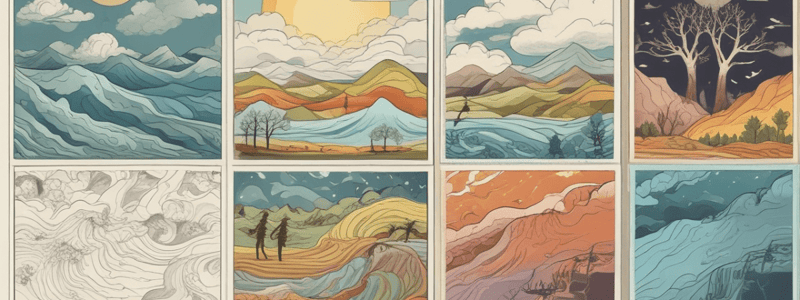Podcast
Questions and Answers
What is the main reason for the change in seasons on Earth?
What is the main reason for the change in seasons on Earth?
- The angle of the Sun's rays on the Earth (correct)
- The distance between the Earth and the Sun
- The speed of the Earth's rotation on its axis
- The Earth's orbit around the Sun
What happens to the Sun's rays when the Earth is tilted towards the Sun?
What happens to the Sun's rays when the Earth is tilted towards the Sun?
- They are more spread out over a larger surface
- They are less concentrated
- They are more concentrated (correct)
- They remain the same
Where is the Sun higher in the sky during the summer?
Where is the Sun higher in the sky during the summer?
- In the Northern Hemisphere
- Everywhere on Earth (correct)
- At the equator
- In the Southern Hemisphere
Why do we have longer days in the summer?
Why do we have longer days in the summer?
What determines the length of each day?
What determines the length of each day?
What is the path of the Sun in the sky during the winter?
What is the path of the Sun in the sky during the winter?
Why do we have shorter days in the winter?
Why do we have shorter days in the winter?
What is the main reason for the difference in day length?
What is the main reason for the difference in day length?
Which season is characterized by vegetation starting to appear in the Northern Hemisphere?
Which season is characterized by vegetation starting to appear in the Northern Hemisphere?
During which months does winter occur in the Southern Hemisphere?
During which months does winter occur in the Southern Hemisphere?
What is the primary reason the Earth has seasons?
What is the primary reason the Earth has seasons?
In which season do deciduous trees typically shed their leaves in the Northern Hemisphere?
In which season do deciduous trees typically shed their leaves in the Northern Hemisphere?
What is the warmest season of the year in the Southern Hemisphere?
What is the warmest season of the year in the Southern Hemisphere?
Why is it not true that being tilted towards the Sun makes it warmer because you're closer to the Sun?
Why is it not true that being tilted towards the Sun makes it warmer because you're closer to the Sun?
Which season has the most hours of daylight?
Which season has the most hours of daylight?
Flashcards are hidden until you start studying
Study Notes
Seasons
- The year is divided into four seasons: spring, summer, autumn, and winter, each with distinct weather and daylight hours.
- The differences between seasons vary in different parts of the world.
Seasonal Periods
- Spring: March to May in the Northern Hemisphere, and September to November in the Southern Hemisphere.
- Summer: June to August in the Northern Hemisphere, and December to February in the Southern Hemisphere.
- Autumn: September to November in the Northern Hemisphere, and March to May in the Southern Hemisphere.
- Winter: December to February in the Northern Hemisphere, and June to August in the Southern Hemisphere.
Seasonal Characteristics
- Spring: Vegetation starts to appear after winter.
- Summer: Warmest season, longest daylight hours, and most vegetation is present.
- Autumn: Harvesting of crops and fruits, and leaves of deciduous trees fall.
- Winter: Coldest season, deciduous trees have lost their leaves, and plants and animals hibernate.
Causes of Seasons
- The position of the Sun in the sky due to the Earth's tilt of 23.4 degrees.
- The tilt of the Northern Hemisphere towards the Sun in summer and away from the Sun in winter.
- The angle of the Sun's rays on the Earth, with more concentration in summer and more spread out in winter.
Daylight Hours
- The position of the Sun in the sky affects the length of each day.
- In winter, the Sun takes a low path across the sky, resulting in shorter days.
- In summer, the Sun takes a high arc across the sky, resulting in longer days.
- The Earth's tilt causes the changes in daylight hours.
Studying That Suits You
Use AI to generate personalized quizzes and flashcards to suit your learning preferences.




